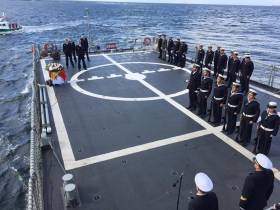Displaying items by tag: Armada Tribute
Spanish Navy Pay Tribute to Armada Fleet off Sligo's Streedagh Beach
#ArmadaEvent - The Spanish Navy held a ceremony in memory of the Armada fleet that brought the 6th annual Celtic Fringe Festival to a close at Streedagh Beach in Sligo on Sunday afternoon.
Tributes were paid on land and at sea to the memory of the 1,100 souls who perished at Streedagh in 1588 when three Armada ships were wrecked during Winter storms.
And while the weather was more benign this afternoon, when intermittent Autumn showers fell on the crowd who gathered at the Armada monument at Streedagh, further out to sea, the Spanish Navy’s OPV Centinela, a fisheries patrol ship, performed a moving tribute to their fallen comrades.
“Today was very special for all of us on board,” said the captain of the Centinela, Lieutenant Commander Miguel Romero Contreras after a poignant ceremony in which he, as senior officer on board, and his most junior seaman, Alvaro Couce, laid a floral wreath on the Atlantic ocean, which had claimed the lives of so many of their countrymen over 4 centuries ago.
A very poignant ceremony has concluded just off shore at Streedagh. The captain of the Spanish navy vessel Centinela has laid a wreath to commemorate the sailors who lost their lives in 1588 when three ships from Spanish Armada sank off the Sligo coast.
“The emotion of a day like this is difficult to put into words,” added the Lieutenant Commander. “Remembering the passing of so many countrymen many years ago far away from home was a very important event for us, and I would like to thank sincerely the people of Sligo for making us feel so welcome here.”
This was the first time a Spanish military vessel had journeyed into Sligo Bay since the ill-fated voyage of the Spanish Armada, when the 3 ships, La Lavia, La Santa Maria de Visón and La Juliana were lost as the Spanish retreated following a failed invasion of England.
Many of the lives were lost as the Spanish sailors, soldiers and merchants tried unsuccessfully to make it to shore, and the subsequent letter, written by one of the survivors, Captain Francisco de Cuellar, to King Phillip II of Spain, provides us with a unique insight into the Ireland of the time.





























































